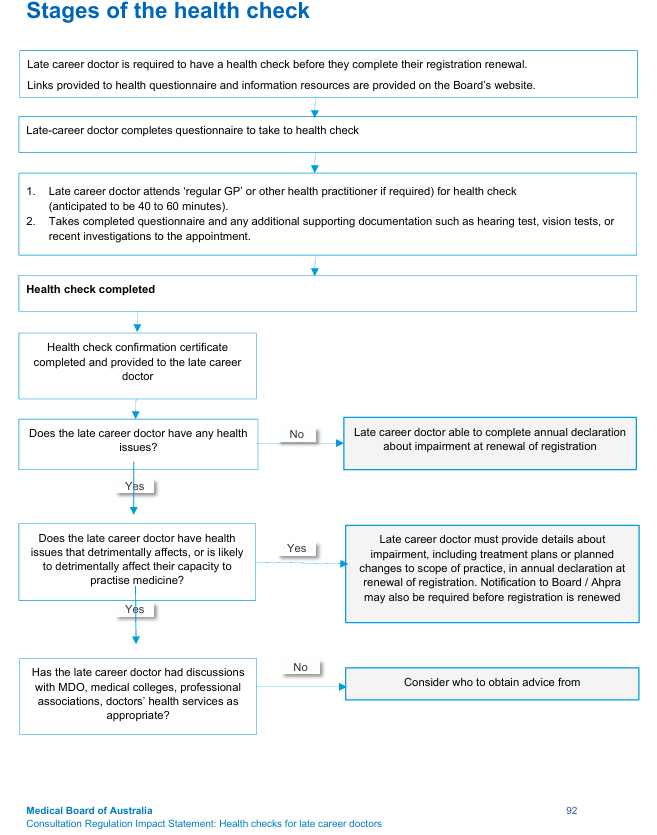Articles / What will mandatory health checks actually look like?

While the consultation period is open until 5 October, the Medical Board has outlined its proposal for mandatory health checks for doctors aged 70 and older in great detail in a “consultation regulation impact statement” on their website.
Last year, notifications about late career doctors were 81% higher than for doctors under 70 — and were 1.7 times more likely to result in regulatory action.
This has prompted the Board to seek feedback on three options for doctors aged 70 or older (keeping the status quo, requiring intensive assessments with a specialist occupational physician, or general health checks with their GP— the latter of which they say is their preferred choice).
From age 70, doctors would be required to undergo general health checks with their GP or another doctor every three years. From age 80, the health checks would be required annually.
Ideally, this would be done by their regular GP, though the Board states repeatedly that they plan to take a flexible approach, acknowledging that not all doctors will feel comfortable assessing their peers. “In most instances, the checks would be conducted by the late career doctor’s regular GP, with some components of the health check able to be performed by other health practitioners with relevant expertise, such as audiologists, optometrists, or nursing staff in the general practice,” the Board explains.
They Board notes that with GPs already providing Medicare-funded health assessments for people over 75, so no additional training would be mandated for them to conduct the health checks for their colleagues. But it says optional resources and educational support would be available.
They reiterate that the health checks are different to a detailed ‘fitness to practice’ assessment, instead framing them as an “opportunity,” to intervene early, make informed decisions and reduce risk to patients—as well as to support doctors’ wellbeing. The Board emphasises that results would remain confidential between the late career doctor and their assessing/treating doctor.
“The Board would NOT receive information about any health issues identified in the checks and would NOT receive any results of the health check.”
However, doctors would have to self-declare that they have completed the health check and disclose any impairments that could affect their capacity to practice medicine on their annual registration renewal form.
The proposed health check would take between 40-60 minutes, plus about 10 minutes to fill out the questionnaire, and would cover cognitive function, as well as cardiovascular, respiratory, gastro-intestinal, genito-urinary, mental health, neurological, musculoskeletal, manual dexterity, skin and heamatology, hearing, endocrinology and sight.
When it comes to assessing cognitive function, the document outlines a number of principles, and states that “while the cognitive screening may indicate the need for further evaluation, a full cognitive evaluation is outside the scope of the health check. If the initial cognitive screening indicates concern, a follow-up visit and/or referral to an appropriate specialist (geriatrician, old age psychiatrist, neurologist) will be required.”
The only doctors aged 70 or over who would not be required to complete the check to stay registered would be those with non-practising registration.
“Doctors who do not directly provide clinical care, such as those practising in medical administration or medico-legal practice who require a practising form of registration and whose work impacts on patients, consumers or the community, would be required to have health checks,” the Board explains.
“Action to address identified health issues and/or return the late career doctor to safe practice whenever possible, would ideally be conducted at arms-length from the Board. There would be no requirement to report the outcome of the health check to the Board or AHPRA, unless the doctor has been found to pose a substantial risk to the public that is not being managed. Mandatory reporting is only likely to be necessary when unmanaged substantial risk is identified,” the consultation document states.
The appendix of the consultation even includes a draft flow chart, questionnaire and sample assessment form, suggesting the proposed mandatory health checks that paints a detailed picture of what the Board has in mind.

AHPRA and the Medical Board are still seeking feedback on the options being considered, and you can find more information on how to make a submission on their website.

Menopausal Hormone Therapy - What Dose of Estrogen is Best?

Cardiovascular Benefits of GLP1s – New Evidence

Oral Contraceptive Pill in Teens

RSV and the Heart


Modified but kept in place
Eliminated entirely without replacement
Maintained as is
Completely replaced with an alternative system
Listen to expert interviews.
Click to open in a new tab
Browse the latest articles from Healthed.
Once you confirm you’ve read this article you can complete a Patient Case Review to earn 0.5 hours CPD in the Reviewing Performance (RP) category.
Select ‘Confirm & learn‘ when you have read this article in its entirety and you will be taken to begin your Patient Case Review.
Menopause and MHT
Multiple sclerosis vs antibody disease
Using SGLT2 to reduce cardiovascular death in T2D
Peripheral arterial disease
